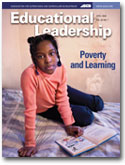As an educator, you're probably aware of ASCD's whole child initiative, launched in 2006—our public engagement and advocacy campaign to ensure that all students have access to a rich curriculum in a healthy, supportive environment. Today, when federal and state education policies place so much emphasis on high-stakes tests that measure a limited set of outcomes, the whole child initiative promotes a broader definition of education—the development of healthy, safe, engaged, supported, and challenged students.
But did you know that this "new" initiative is built on 65 years of unwavering commitment to the whole child? Since 1943, ASCD members have been at the forefront of efforts to keep the broad aims of education in view. A look back tells the story.
For instance, browse through past issues of Educational Leadership (accessible to members on the ASCD Web site at www.ascd.org/el). The first issue was published in October 1943 in the midst of World War II. Yet in the very first article, "Of Greater Moment than Guns," Harold Benjamin pointed out that victory in battle alone would not preserve democratic values; just as important was the struggle to define and carry out the broad aims of education by asking,<BQ>What kind of men and women does a good society for our time need? How can education produce such men and women?</BQ>
A year after the war had ended, the theme of the December 1946 issue of ELwas "Balanced Living for Children and Youth." The introduction posed questions that are still worth asking today:Do students in your school tackle problems that are real and important to them? Use the total community as their learning environment? Learn to be both good leaders and good followers? Have time for rest as well as play? Acquire skills in group living, physical skills, and skills for rich leisure-time activities? (p. 150)
- Healthy—for example, "Fitness and Health" (March 1963); "Healthy Bodies, Minds, and Buildings" (March 2000).
- Safe—"Schools as Safe Havens" (October 1997); "Creating Caring Schools" (March 2003).
- Engaged—"Individualized Instruction: Another Look" (February 1977); "Do Students Care About Learning?" (September 2002).
- Supported—"Improving Conditions for Students at Risk" (March 1987); "Helping Struggling Students" (February 2006).
- Challenged—"The Challenge of Higher Standards" (February 1993); "Teaching for Meaning" (September 2004).
ASCD books, professional development opportunities, newsletters, and multimedia resources tell the same story: ASCD has consistently been there to support education leaders as they kept their eyes on the essential goals of education. From time to time, the Association has played a role in calling education trends into balance. For example, look at the 1962 ASCD Yearbook,Perceiving, Behaving, Becoming: A New Focus for Education. Three years after the launch of Sputnik, attention in education was "riveted on the technological revolution, alternative proposals for organizational structures, and updating knowledge in government-favored academic areas," wrote ASCD president William Van Til in his introduction (p. iii). Juxtaposed against these trends, the yearbook's stated purpose is striking:The fullest possible flowering of human potentiality is the business of education. It is our reason for being. Whatever we decide is the nature of the fully functioning, self-actualizing individual must become at once the goal of education. (p. 2)
Today we again see the need to restore balance in education. Calls to raise academic standards have been translated into strategies that boost test scores but too often ignore the development of motivated, well-balanced, healthy children and youth. So although ASCD is firm in supporting academic rigor, we know that schools must produce graduates who possess not only core knowledge and skills, but also the deeper understandings and social abilities to become citizens of the 21st century.
The whole child initiative is the outgrowth of the enduring values that have always been at the heart of your work—and ASCD's. As the Whole Child Web site (www.wholechildeducation.org) explains,<BQ>Since its inception, ASCD has built on a core set of values and beliefs in support of the whole child. Our initiative, Educating the Whole Child: The New Learning Compact, connects these values and beliefs. It's a framework for expressing what we do.</BQ>
